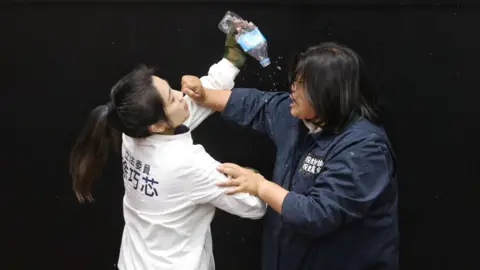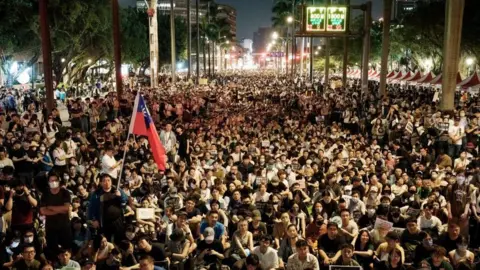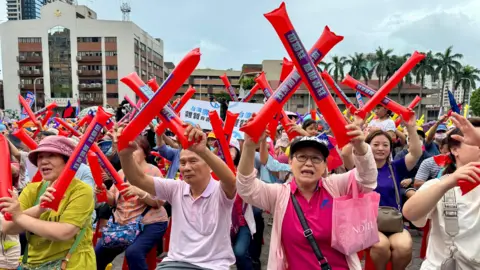BBC News, Taipei
 Getty Images
Getty ImagesFor most of his life, Deng Pu didn’t see himself as an activist – but that changed last year.
Furious at what he felt was undemocratic behaviour by Taiwan’s lawmakers and overt Chinese influence in parliament, he joined thousands of others in a massive street protest. Two months ago, he signed up with a campaign group.
He has never done these things before. “Previous social movements were important, but to be honest they didn’t make me this angry,” the 39-year-old photographer told the BBC. “We are citizens… and we need to make sure our society sticks to its democratic systems and spirit.”
Now, that anger is reaching a turning point. On Saturday Taiwan will hold a vote to decide whether to kick out more than two dozen lawmakers accused of being too close to China, in what has been called “dabamian”, or the Great Recall.
The unprecedented vote may alter the balance of political power in Taiwan. But already it has deepened political divisions, with both sides of the debate claiming to be the saviour of Taiwan’s sacred democracy.
It began with last January’s elections, when voters chose the Democratic Progressive Party’s (DPP) William Lai as their president, but gave the opposition the dominant presence in the parliamentary Legislative Yuan.
In the following months, the main opposition party Kuomintang worked together with the smaller Taiwan People’s Party and independents to block DPP bills and pass controversial pieces of legislation. This included limiting the constitutional court’s powers, cutting the government’s budget, and raising the threshold for holding recall votes.
These moves provoked significant outrage among some Taiwanese, who saw them as stymying the DPP government while strengthening the opposition’s parliamentary power.
In May 2024, thousands began holding protests in what became known as the Bluebird movement, named partially after the Taipei street where many had gathered.
 Getty Images
Getty ImagesMany in the movement believe the opposition, led by the Kuomintang which is known for its relatively friendlier position on China, is being influenced by Beijing and secretly pushing China’s agenda in Taiwan’s legislature.
The party has denied this, but suspicion grew when a group of Kuomintang lawmakers visited China last year and were welcomed by top-ranking Chinese Communist Party official Wang Huning.
Civic groups in the Bluebird movement launched petitions to oust various Kuomintang lawmakers, while Kuomintang supporters retaliated by doing the same to some DPP lawmakers.
So far, petitions for 31 lawmakers’ seats have received enough preliminary support to proceed with a final recall vote. All these seats are held by the Kuomintang – and if enough are successfully recalled, it could mean the DPP eventually gains the majority in the legislature.
While Taiwan has held recall votes before, it has never seen so many within such a short space of time.
On Saturday, citizens in 24 districts will vote on a simple yes or no question: whether they agree to boot out their legislator. Another round of voting will be held in August for the remaining recall cases.
In each district, if the number of votes exceeds 25% of registered voters and more than half approve the recall, the seat will be vacated and a by-election must be held within three months.
This means that voter turnout is crucial for the Great Recall’s success – and it is the reason why civic groups have been relentlessly flooding social media and pounding the streets canvassing for votes.
On a recent weekday night, Deng Pu and several members of his civic group stood outside a Taipei subway station. Some held up banners and chanted slogans, while others distributed paper fans and tissue packets emblazoned with the words “Let’s go out together to vote” and “Say yes to the recall”.
Mr Deng acknowledged that with several of the recall votes taking place in Kuomintang strongholds, even if they did succeed, the party could be re-elected in by-elections.
Even so, the Great Recall would still be worth it, he insisted, as it was a way to “correct our democracy”.
Whatever the result may be, it would “send a strong signal to all the political parties you must respect the latest wishes of Taiwan’s citizens.”
Mr Deng acknowledged that many in the Bluebird movement were DPP supporters, but denied that the civic groups were funded by the party – a theory heavily pushed by the opposition.
“We don’t care whether DPP wins the by-elections. What’s more urgent to us is that we hope to have a normal parliament, one that is not close to China and the Chinese Communist Party.”
He also took issue with what he saw as a weak response from the DPP, saying: “From the first recall petition till now, the civic groups have been telling the DPP that the citizens are here and there are many of us… We are strongly calling on the DPP to join us.”
 BBC / Tessa Wong
BBC / Tessa WongThe DPP had initially sought to distance itself from the Great Recall. But eventually it showed its support, with Lai stressing that the DPP “must align with the power of the people” and ordering party officials to assist pro-recall groups to “protect the nation”.
This has inevitably fueled the opposition’s accusation that the DPP has secretly engineered the Great Recall and Bluebird movement, pointing to the fact that the DPP could reap the most political gain.
It not only stands a chance of winning a permanent majority in the legislature. Even if the Kuomintang eventually wins in the by-elections, the DPP would have held the majority for a few weeks, giving it enough time to push through crucial laws.
Anti-recall protests organised by the Kuomintang and other opposition parties have drawn thousands. At one such rally in the New Taipei district of Banqiao last weekend, supporters showed up waving banners and chanting “No to the vote” while crossing their arms.
As they took to the stage, speaker after speaker condemned the Great Recall while characterising William Lai as a fascist and authoritarian traitor of Taiwan’s democracy.
Large screens played videos of Lai doctored to make him look like Adolf Hitler with the words “Fuhrer Lai”, as well as the slogan “Green Terror” – a reference to the DPP’s party colour and the White Terror, a period of authoritarian rule and political repression under the Kuomintang.
The rhetoric echoed that of Beijing, which has waded into the debate while watching from afar. Its Taiwan Affairs Office has accused Lai of “engaging in dictatorship under the guise of democracy” and “using every means possible to suppress the opposition”.
“The recall lawmakers were chosen by the majority of voters in their districts. If they are not good enough, they can be voted out in the next election,” said rally attendee Mu Zili. “Why should we be using this evil way of getting rid of them?”
The 68-year-old night shift worker insisted that the lawmakers were being targeted simply because they belonged to the Kuomintang, and that the Bluebird activists were working for the DPP.
“You can’t have one party take down the other one in one big recall, this is not democratic,” Ms Mu said.
“I side with blue,” she added, referring to the Kuomintang’s party colour. “But I don’t oppose green. I’m here not because I support the Kuomintang, but to protect democracy.”
But there are also many Taiwanese who are on the fence.
Watching the anti-recall rally from the sidelines was Banqiao resident Peggy Lin. Like several other bystanders the BBC spoke to, she was bewildered by the fuss over the Great Recall.
“I don’t know what it’s about really, I haven’t followed the debate at all… so I don’t have an opinion,” said the 43-year-old childcare worker.
“I will vote after I read more into it and decide based on how I feel on that day about it.”
 BBC / Tessa Wong
BBC / Tessa WongAnalysts say that regardless of the outcome, the Great Recall will leave a lasting impact on Taiwan’s polarised society.
The political fighting has gotten nasty at times. Legislators have brawled in parliament over the political deadlock, while activists have faced doxxing and abuse. Mr Deng told the BBC that while out canvassing, he and his team mates had been assaulted or pushed around by residents opposing the vote.
The vote has also not gone without scandal: officials have discovered numerous forged signatures, many of deceased voters, in recall petitions against both DPP and Kuomintang lawmakers.
The vote “will cement the notion of four year terms as not a given but as conditional on performance and subject to periodic reviews. Political polarisation will likely get worse before it gets better,” said Wen-ti Sung, a political scientist with the Australian National University’s Taiwan Studies programme.
But the Great Recall is also “creating space for renewed political activism”, especially for DPP supporters, added Dr Sung, which he characterised as an overall boon to the resiliency of Taiwan’s civil society.
Ian Chong, a non-resident scholar with Carnegie China, said if many of the recall votes succeed, “one signal it would send to politicians in Taiwan is that they should be careful with how far they push the line in public sentiment… they can’t stray too far as there would be consequences”.
“But if it fizzles out, then it emboldens politicians to do what they want,” he noted.
“It will intensify the polarisation… and it would be easy for politicians to write off the Great Recall as yet another civil society movement that doesn’t get enough momentum beyond a certain part of the population.”
If there was a close but not conclusive result overall, however, it may mean “the Kuomintang and DPP will have to ultimately seek compromise and work together”.
This, added Dr Chong, “may not be a bad thing for Taiwan”.






